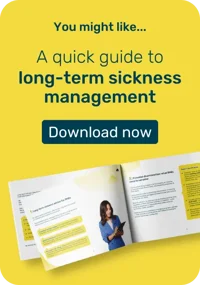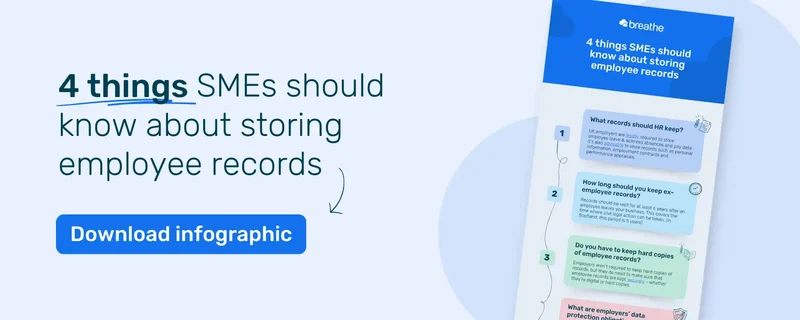Which HR policies are required?
With the number of potential HR policies you could implement, it would be easy to feel overwhelmed. However, UK law only requires companies based in the UK to have three main policies. These are:
1. A disciplinary and dismissal policy
A disciplinary policy makes it easier to deal with problems in your SME. It also tells employees under what circumstances they will be disciplined. A disciplinary policy should comply with the ACAS code of practice.
2. A grievance policy
A grievance policy tells employees who they should discuss any issues they encounter in the workplace. It tells employees what steps they should follow if they want to make a complaint and clearly outlines what the company should do in response to complaints they receive.
3. A health and safety policy
A health and safety policy is there to keep employees safe and protected, and should highlight the safety procedures in place together with what employees should do to keep everyone safe. It should detail what employees need to do in the case of an emergency, injury or fire. It should also outline where first aid kits are kept and who the trained first aiders are.
There are other policies that are considered best practice, but ultimately, it’s up to you as an SME owner or manager to decide which policies are most appropriate for your organisation. Additional HR policies you may wish to consider implementing are:
-
Equal opportunities
-
Sickness and leave of absence
-
Training and development
-
Code of conduct
-
Internet and email
-
Drug and alcohol
-
Social media
-
Privacy policy
Although it may feel tempting to assume employees will ‘know how to behave’, by taking the time to set up clear policies you make life easier for times ahead. Think of it as an investment in your future success.
How to write clear HR policies
It’s essential that your HR policies are unambiguous; they should also be easy for all your employees to understand. Some of the ways you can ensure your HR policies are clear are to:
-
Write in plain language.
Avoid jargon or complex language. The way your HR policies are written might make sense to you, but will all your employees understand them? It sometimes feels comfortable to write these important documents in very formal language, but this can intimidate your employees which defeats the purpose of writing them. If you’re not sure how easy your policies are to understand, consider asking someone else to review them for you. You could even use a professional proof-reader or copywriter to help you simplify them without losing the important detail.
-
Keep them brief.
Lengthy policies will result in employees skimming the detail and missing out important details. Stick to the important information only and you’ll find your employees are more likely to read to the end and crucially, understand your HR policies.
-
Keep it current.
Make sure you regularly review policies to ensure they’re in line with latest legislation and changes to your business. It’s good practice to avoid using super-specific details which can quickly become outdated such as employee names. It’s also important to include a date created ‘last updated’ date on each document so readers can see how recently the policy was updated.
How to sense-check your HR policy
No-one wants to think their HR policy is unhelpful. However, without the right focus, that’s exactly what it can become. It pays to sense-check your HR policy before sharing it with your employees. Here are some things to look out for…
Examples of good HR policies
-
Regularly updated
-
Specific to your SME and its particular needs
-
Explain what is expected of everyone
-
Easy to read and understand
-
The right length – neither too long and rambling, nor too brief
-
Easy to access for all employees
-
Allow for managerial discretion
-
Include helpful information and signposts such as a glossary or links to websites/other company documents.
Examples of bad HR policies
- Assume bad behaviour is likely
- Treat employees like children
- Tell managers what to do and don’t allow for individual circumstances
- Are long, complex or unnecessarily formal, or are too short to be informative.
Ready to write your own HR policies?
Getting ready to write HR policies for your SME doesn’t need to feel daunting. There are several ways you can get started quickly and painlessly.
1. Using HR policy templates
There are a number of HR policy templates available which make the job of getting started far easier. A word of caution – make sure you adapt them for your business and don’t do a cut and paste job. Failing to give enough attention to the detail of your policy may cause trouble in the future.
-
ACAS have a number of policy templates which are free to download and adapt.
-
The CIPD have policy templates on their subscription-based HR-Inform
-
You can download individual templates for a fee from specialist providers online.
2. Reviewing someone else's policy
Many organisations publish their policies online and there’s nothing to stop you from drawing inspiration from their work. Review a variety to compare the different styles before creating your own documents. Remember to consider the scale of your SME when reviewing HR policies from other organisations.
As an example, here is Channel 4’s Flexible working policy, and here are links to some of Durham University’s HR policies.
3. Using our resources
The Breathe Blog has a range of articles to help you create your own HR policies including information on flexible working policies and bullying and harassment policies.
4. Getting professional help
Using an HR professional or employment law specialist is an easy way to outsource the creation of your HR policies. However, the content must come from you – a professional can only work with you to create policies to support your SME.
Discover how Breathe's document management feature can help you store your employee records & HR policies easily and securely. Trial for free today for 14 days.







